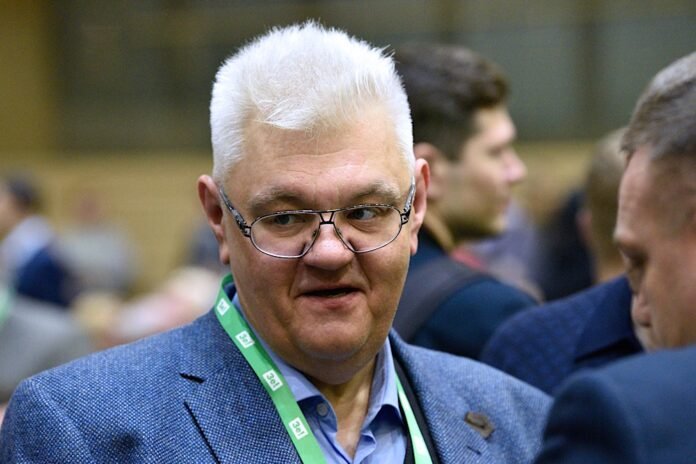By Nikolai Petro, Responsible Statecraft, October 23, 2023
Sergei Sivokho, Ukrainian peace activist, succumbed to chronic asthma and passed away on October 17. His name was not well known outside Ukraine, perhaps because, in these angry times, he sought to reconcile Ukrainians rather than drive them apart.
One wonders if, in the end, this big bear of a man died of a broken heart.
Sivokho rose to political prominence thanks to his close personal friendship with Volodymyr Zelensky. He was the creative producer of the comedy show Kvartal 95 and after Zelensky’s unexpected victory, the newly minted president tried to get him to run for public office. Sivokho, originally a native of Donbass, asked instead to be appointed advisor to the National Security and Defense Council of Ukraine with the remit of advising on humanitarian policies toward his native region.
Very quickly, however, he came to the conclusion that peace in Ukraine had to be approached from a radically different perspective, namely by putting an end to what he termed “the war inside our own heads.”
According to Sivokho:
“More terrible than the coronavirus is the virus of hatred. It is important to change not only the attitude of the state to its citizens, but the attitude of people to each other . . . What my team is doing is trying to incline people to mutual understanding . . . because the peace that we are all seeking begins in the hearts and minds of every Ukrainian ”
At first Sivokho’s optimism was echoed by Zelensky himself. At the 2020 Munich Security Conference, and later at the Forum on Unity in Mariupol, Zelensky called for “a massive national dialogue,” where people could discuss their common future face-to-face. To this end, he endorsed Sivokho’s pet project — a National Platform for Reconciliation and Unity — which was formally presented to the public on March 12, 2020.
That presentation, however, lasted just 20 minutes, because a gang of some 70 young people from the National Corps (the civilian wing of the Azov Battalion) stormed into the hall, and with shouts of “traitor,” pushed Sivokho until he fell to the ground. Sivokho was fired from his advisory government position two weeks later.
It may seem odd that even before Russia’s invasion, merely mentioning reconciliation and dialogue could arouse so much anger, until one realizes that what Sivokho was actually asking for was a fundamental shift in Ukrainian political thinking. In his mind, Ukrainians had to recognize that they all bear some measure of responsibility for the conflict in Donbass, and specifically for dehumanizing the Other Ukrainians, those who do not think or talk the way they do.
Such policies, he argued, began well before 2014. His words aroused intense anger among Ukrainian nationalists, who were further outraged by his assertion that, “the time has come to correct mistakes, to forgive and to ask for forgiveness . . . to talk to the people living in the uncontrolled territories.”
After being fired, and despite threats on his life, Sivokho persisted in his peace efforts until the very end. Over time, he became increasingly critical of government policy, though never of his longtime friend, Zelensky. He called for changes to the Ukrainian language laws that severely restrict the public use of Russian. He said that the government’s refusal to implement the Minsk Accords had led Ukraine into a dark and isolated corner.
He even revealed publicly that the rebels had made a formal proposal to return nationalized companies to their Ukrainian owners, and to have the contentious “special status” for Donbass end in 2050, and he rebuked the Ukrainian government for refusing to even talk to the rebels.
Rather than prohibiting contacts between local officials across the contact line, Sivokho urged them to talk to each other. “Imagine,” he says, “how they would rejoice and sorrow together. If they were only allowed to return there, they would restore their villages on their own, from both sides. What a fantastic example that would be!”
His last public battle was to prevent passage of the draconian law “On the Basics of State Policy in the Transition Period,” sponsored by then Minister for Reintegration of the Occupied Territories (later Minister of Defense), Oleksiy Reznikov. Sivokho complained bitterly that the Reznikov Plan, which was approved by the Cabinet of Ministers in August 2021, treated the Ukrainians in Donbass and Crimea as a conquered people.
Rather than allowing animosities to subside, he said, this would ensure that they are passed on to future generations. The rebels themselves would be long gone, but like Banquo’s Ghost, their spirit would still haunt Ukraine’s future, an impertinent reminder of the Other, Russophone Ukraine, that Ukrainian nationalists would still be busily trying to erase.
Some Ukrainian nationalists will rejoice at the demise of this inconvenient Ukrainian patriot who fought tirelessly to overcome the country’s divisions by preaching mutual forgiveness. His personal quest for peace may now be over, but we should all hope, for Ukraine’s sake, that his mission is taken up by others.









